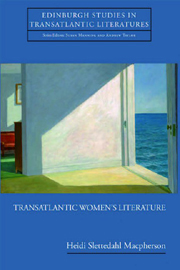Book contents
- Frontmatter
- Contents
- Acknowledgements
- Introduction: ‘No Region for Tourists and Women’
- Part 1: The Exoticised Other
- Introduction
- 1 Constructing Race across the Atlantic: Nella Larsen's Quicksand
- 2 Assimilation in the (Fictional) Heartland: Bharati Mukherjee's Jasmine
- Part 2: Memoirs and Transatlantic Travel
- Part 3: Negotiating the Foreign/Re-Inventing Home
- Conclusion
- Bibliography
- Index
Introduction
from Part 1: The Exoticised Other
Published online by Cambridge University Press: 12 September 2012
- Frontmatter
- Contents
- Acknowledgements
- Introduction: ‘No Region for Tourists and Women’
- Part 1: The Exoticised Other
- Introduction
- 1 Constructing Race across the Atlantic: Nella Larsen's Quicksand
- 2 Assimilation in the (Fictional) Heartland: Bharati Mukherjee's Jasmine
- Part 2: Memoirs and Transatlantic Travel
- Part 3: Negotiating the Foreign/Re-Inventing Home
- Conclusion
- Bibliography
- Index
Summary
The construction of racial and ethnic identities across the transatlantic space almost inevitably leads to an investigation into the lure of the exotic ‘other’. The enforced othering of those from different social, ethnic and religious backgrounds is a well-known phenomenon, one that a range of critics has ably examined, from Edward Said's exploration of Orientalism to Mary Louise Pratt's analysis of the ‘contact zone’ as well as other postcolonial examinations of identity and identity makers. Indeed, European and American travel literature, particularly from the nineteenth century, frequently rested on a notion of otherness against which the authors measured themselves and ‘home’. Yet the concept of home is not entirely without its difficulties. Alasdair Pettinger's important anthology, Always Elsewhere: Travels of the Black Atlantic, explores how diasporic writers negotiate a sense of shifting identity, acknowledging that for these writers,
it is not always clear where ‘home’ is. And for that reason it is the subject of a much wider range of emotions – nostalgia, indifference, exasperation, perplexity, embarrassment. In any case, the expected contrast between the familiarity of home and the strangeness of abroad that underpins so much travel literature is often absent.
Moreover, many writers of the Black Atlantic encounter racist assumptions about who can travel, and why. Inderpal Grewal thus argues that the framework of travel as a ‘universal form of mobility’ is seriously flawed; it is, rather, a Eurocentric construction that aestheticises travel as choice and denies its other manifestations, such as slavery, deportation, im/migration, and indentured servitude.
- Type
- Chapter
- Information
- Transatlantic Women's Literature , pp. 33 - 41Publisher: Edinburgh University PressPrint publication year: 2008



